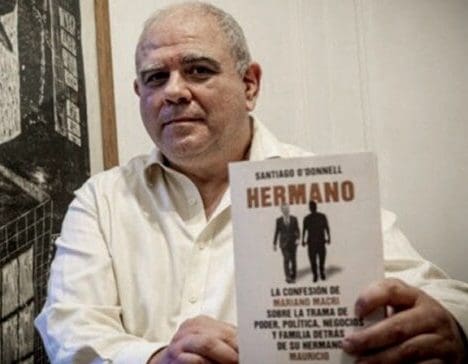On 22 June, Santiago O’Donnell won his appeal before the Supreme Court in Argentina, defending his right not to surrender his source materials. The judgment is a landmark one, asserting that the decision to make public the content of interviews remains with the journalist, rather than the interviewee.
The case
Back in 2021, we began supporting the defence of Santiago O’Donnell, an Argentinian investigative journalist, author and editor of international news at newspaper Página 12.
O’Donnell had published a controversial book, entitled “Brother: Mariano Macri’s Confession about the web of power, politics, business, and family behind his brother Mauricio”, in October 2020. It detailed the rise of Mauricio Macri to the presidency, drawing on research and interviews with the former president’s brother, Mariano.
Once published, the book received a swift and powerful backlash from the Macri family. Mariano Macri requested that the journalist be ordered to provide a copy of the recordings of the interviews they allegedly conducted between January and August 2020, which O’Donnell used to write the book.
Macri specified that the purpose of the challenged measure was to have all the necessary elements to potentially file a claim for damages against the journalist and the publishing company for alleged breach of contract. He believed that these recordings constituted an essential and indispensable preparatory measure for alleged forthcoming lawsuit.
The first instance ruling
In December 2020, the first instance judge ordered Santiago O’Donnell to provide the recordings with Macri within a five-day period. The journalist filed a motion for reconsideration and, alternatively, an appeal, both of which were rejected by the judge.
When appealing the rejection of his motions, O’Donnell emphasised through lawyers Damian Loreti and Cristian del Rosario that only a part of the information had been published. The remaining material was therefore reserved and under the exclusive ownership and responsibility of the professional. This material could be used for future investigations and publications and contained sensitive information. O’Donnell argued that what he was seeking to protect and keep confidential was the unpublished material, which was still being fact-checked and verified through other sources.
Throughout 2021, O’Donnell’s legal team mounted a series of appeals and challenges to the ruling. They argued that the first instance court order could create a dangerous precedent impacting press freedom on the continent. O’Donnell’s subject matter was one of obvious public interest and his newsgathering activities should be protected.
After a number of failed challenges, the legal team attempted a rare appeal to the Supreme Court. On 17 February 2022, the Supreme Court suspended the first instance judge’s decision that had compelled O’Donnell to hand over the interview recordings and requested the referral of the main proceedings.
The judgment
Yesterday, the Supreme Court unanimously deemed the extraordinary appeal submitted by O’Donnell admissible. The Court annulled the first instance judge’s decision and ordered a new pronouncement.
The Court stated that “the [first instance] judge not only issued the preliminary measure without providing serious and compelling grounds regarding all the requirements for its admissibility, but also, in rejecting the motion for reconsideration, failed to provide a concrete and reasoned response on the absence of the necessity requirement, and upheld the measure based on arguments that, in some way, demanded a prior examination of the mentioned issue.”
To read the full judgment, in Spanish, click here.
Recent News
World Press Freedom Day Side Event: Profiling and surveillance, a renewed challenge to freedom of expression
From May 2-4 2024, UNESCO and the government of Chile will host the 31st edition of World Press Freedom Day in Santiago. The global commemorative conference commemorates the vital role of journalism and information access in fostering a sustainable future that upholds diversity of voices. Media Defence is organising a side event at the conference […]
Landmark Ruling: Kenya’s High Court Declares Colonial-era Subversion Laws Unconstitutional
Media Defence welcomes the verdict of the High Court in Nakuru, striking down sections of the Kenyan Penal Code which criminalise subversion, citing them as relics of colonial oppression that curtail freedom of expression. Justice Samwel Mohochi, delivering the judgment, asserted that these provisions were overly broad and vague, stifling dissent rather than serving any […]
UN Rapporteurs Call for Protection of Brazilian Journalist Schirlei Alves
UN Rapporteurs Call for Protection of Brazilian Journalist Schirlei Alves Amid Defamation Charges Stemming from Rape Trial Coverage A letter dispatched by UN rapporteurs to the Brazilian Government calls for protective measures for women journalists covering cases of sexual crimes. The letter also denounces the conviction of Brazilian investigative journalist and women’s rights defender, Schirlei […]



